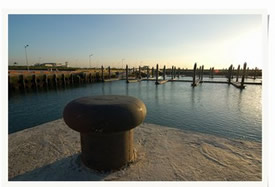.jpg) ◎The Combination of Our Research Project and General Guidelines of Grades 1-9 Curriculum
◎The Combination of Our Research Project and General Guidelines of Grades 1-9 Curriculum
Our research project is led by teachers who discussed about the characteristics of local area and introduced it to students who were willing to join this project. Based on Zhuwei Fishing Port next to our GonLin Elementary School, we conducted our project into five subjects:
1. The History of Zhuwei Fishing Port: the development of Zhuwei Fishing Port.
2. The Organization of Fishermen Association: the roles and functions of a fishermen association in Zhuwei Fishing Port.
3. Tour Map: research on the traffic and transportation of Zhuwei Fishing Port and draw the map.
4. Seafood:Introduction to seafood in Zhuwei Fishing Port.
5. Religion: research on the religion of fishermen.
 Based on the program of local education, our research project points out the characteristics of the tour resources around our school and preserves our research result by recording the interviews.
Based on the program of local education, our research project points out the characteristics of the tour resources around our school and preserves our research result by recording the interviews.
Our research project follows general guidelines of grades 1-9 curriculum and is focused on “Local Education in Social Studies.” In our research, students are all interested in our project and are not forced to learn. From our discussion and research, our students learned a lot by doing the research by themselves. To cultivate students to love their homewtown is very important. It is the purpose of local education to let children to learn their own land about its nature, culture, history, and humanities.
| Language Arts |
|
Social Studies |
|
Science and Technology |
|
Integrative Activities |
|
Arts and Humanities |
|
◎What digital equipment do we use to accomplish our research project?
| Digital Equipments | Functions |
| Digital Recorder | Record the interviews. |
| Digital Camera | Take pictures of interviews and other sources for the report and the website. |
| Printer | Print sources to other members. |
| Internet | Make online documents for members to share information. |
| DV | Record the process of our research project for members to share with each others. |
◎ In what way do we connect with the organizer of the website contest?.jpg)
Several teachers connected with local people and arranged the interviews. We separate into two groups to ask the elders from different fields and ask for their help and advices.
◎ How do other local people help our research project?
Our school teachers and headmaster all support our research project. Some give us advices and some cheer up. We are very grateful to two elders: the retired chairman of our school Zhe-Lang Yang and Cai-Long Guo from Zhuwei Fishermen Association. Mr. Yang grew up in Zhuwei and knows a lot about it. He suggested us to interview Cai-Long Guo who has worked in Zhuwei Fishermen Association for many years, and he knows a lot about the history of Zhuwei Fishing Port.
When interviewing Huiquan Ice Coffee Shop, we met Fa Zhou and his relatives who were the owner of the ice factory. In 1960s and 1970s, their ice factory offered ice for all the fishing ports of northern Taiwan. We visited the machines that made ice and learned about the process of making ice. He turned a part of their ice factory into a coffee shop and introduced the history and experiences to us and other visitors. Through his information and pictures, we not only learn the knowledge and history but also feel the passion and diligence of local people.
.jpg) ◎ Copyright
◎ Copyright
All the pictures are taken by our project members, and all the information on our website is from the interviews and the public documents of our government.
◎The Sources of Our Website
1. Pictures: All are taken by our project members.
2. Recording: All records are agreed by the interviewers and written by our members.
3. Documents: All documents are from the introduction of tourism in Dayuan Village and Zhuwei Fishing Port published by Taoyuan County Governmnet.
4. Documents about the fishing port: All documents about the fishing port are form the interviews or from the internet.
◎Surprises and Discoveries
Most people do not know the nature, tradition and culture of their hometown. They do not know about the history, customs, and relics of th
If people could learn from the local education to learn their hometown from childhood, when they grow up, they would respect their land. From this research project we learned a lot about Zhuwei Fishing Port which we thought we were familiar with. We found that there are so many people working so hard to make Zhuwei better, so everyone should know more about their own land and make the world better.eir homeland. Therefore, after they grow up, they do not know repay their hometown. It is a pity that our education did not teach them about it.